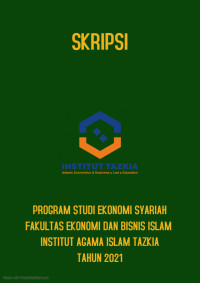Electronic Resource
Investigating The Determinants Of Muslim Intention To Accelerate Zakat Payment During The Covid-19 Pandemic
Purpose – This study aims to investigate Muslim intention to accelerate zakat payment
during COVID-19 pandemic.
Design/methodology/approach – Partial Least Square Structural equation modeling
(SEM) approach is used to test structural models and measurements. Online
questionnaires were distributed to purposively selected respondents throughout
Indonesia, which consists of all major islands. In total, there are 256 respondents
collected.
Findings – This study found that Attitude variable and the Perceived Behavioral
Control variable affect the intention to accelerate zakat payment during the Covid 19
Pandemic. In addition, Subjective Norms variable is not significantly proven as the
determinant.
Research limitations/implications – This study has several limitations. First, the
sample is representative of all islands in Indonesia, but the scattered sample is
dominated by the island of Java. Second, the sample in this study is almost entirely
millennial and generation z, this is due to the author's environment which is dominated
by students so it is rather difficult to get proportional respondents of all ages.
Availability
Detail Information
- Series Title
-
-
- Call Number
-
REF 2X4.144 MUJ i
- Publisher
- Bogor : STEI TAZKIA., 2021
- Collation
-
ES
- Language
-
English
- ISBN/ISSN
-
NIM.17103020
- Classification
-
2X4.144
- Content Type
-
-
- Media Type
-
-
- Carrier Type
-
-
- Edition
-
-
- Subject(s)
- Specific Detail Info
-
-
- Statement of Responsibility
-
Anisa Syahidah Mujahida
Other version/related
No other version available
File Attachment
Comments
You must be logged in to post a comment

 Computer Science, Information & General Works
Computer Science, Information & General Works  Philosophy & Psychology
Philosophy & Psychology  Religion
Religion  Social Sciences
Social Sciences  Language
Language  Pure Science
Pure Science  Applied Sciences
Applied Sciences  Art & Recreation
Art & Recreation  Literature
Literature  History & Geography
History & Geography